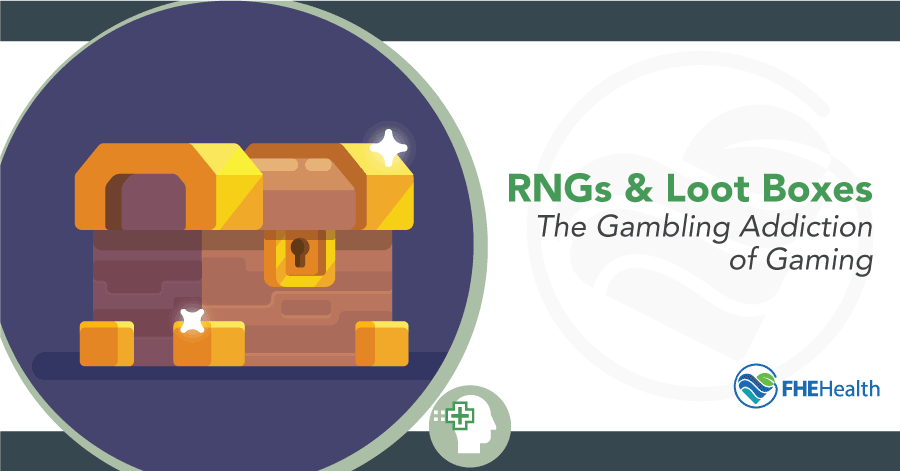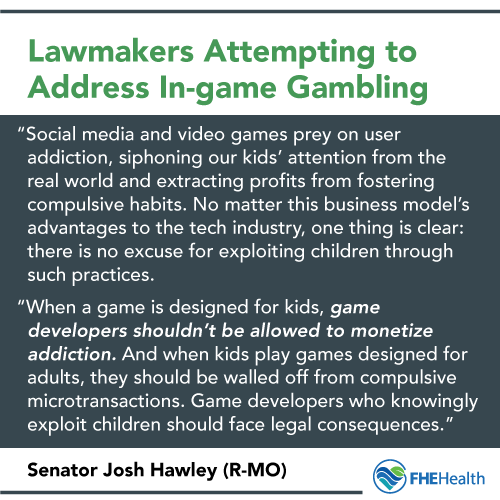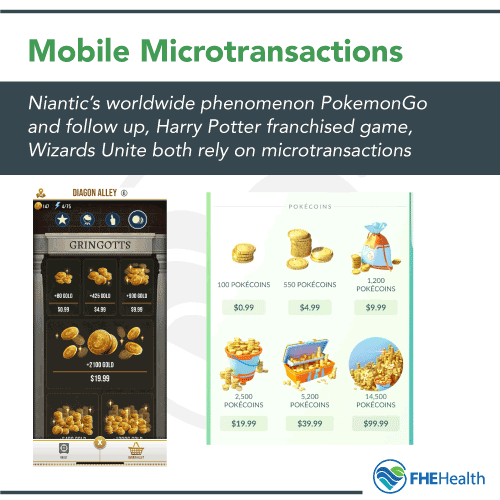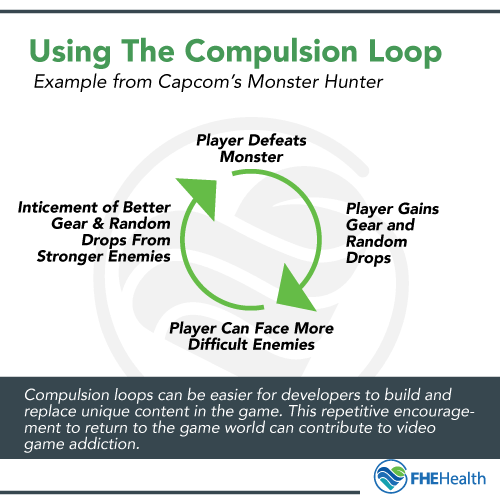
Loot boxes and pay-to-win game structures are a regular part of gaming today, and it seems as though these fixtures are just something we have to learn to live with. Right?
 Not so fast, say advocates such as Iowa Senator Josh Hawley, who states, “Social media and video games prey on user addiction, siphoning our kids’ attention from the real world and extracting profits from fostering compulsive habits.”
Not so fast, say advocates such as Iowa Senator Josh Hawley, who states, “Social media and video games prey on user addiction, siphoning our kids’ attention from the real world and extracting profits from fostering compulsive habits.”
Gamers, from serious console and PC enthusiasts to casual mobile app players, have become accustomed to games offering ways to spend real money to reach certain in-game incentives, so much so that it seems normal. Long gone is the era of getting a full game when you purchase it. We now barely blink an eye when the gameplay is halted, but it can continue if we make a small purchase to recharge whatever digital currency or energy this game has. It’s true that it’s commonplace in modern gaming, but we’ve been conditioned to view this practice as a minor inconvenience, without any major implications on society.
This article discusses the reasons why loot boxes and pay-to-win gaming schemes may be linked with societal issues like addiction more than we realize. Conversely, how some publishers are aware of this human behavior and are creating games that manipulate these impulses and why some countries are using loot box regulations to fight back.
What Is Pay-to-Win Gaming?
Games usually have the same general trajectory, no matter the plot or mechanics: You go through the game and complete challenges. As you get further and complete more of the game’s objectives, the story unravels and the challenges get more complex or difficult.
Some games are lighthearted, revolving around solving puzzles, while others are immersive role-playing games that force you to grind for hours completing quests and leveling up your character. Essentially, the driving force of these two genres is the same: You’re working to do what the game asks of you to complete it.
Traditionally, gaming was simple. You bought a game, put a disc in a console or PC, downloaded the necessary software, and played the game from start to finish, taking as much time as you needed. Today, there are so many ways to play games, from handheld consoles to mobile phones to traditional PCs and game systems.
The difference with current games is that the majority of them are now connected to the internet. This means games can react to your progress, serve you ads, and offer the opportunity to spend real money — from an instantly accessible payment account — to finish an objective more easily or quickly. These are the problematic systems at the heart of the current backlash.
There are two main models for gaming that involve spending real money.
1. Pay-to-Win
 Have you ever been offered the chance to remove ads by paying a certain price while playing a mobile game on your phone? Or maybe a pop-up ad offered 100 gold bars for a low, low price of $9.99.
Have you ever been offered the chance to remove ads by paying a certain price while playing a mobile game on your phone? Or maybe a pop-up ad offered 100 gold bars for a low, low price of $9.99.
Most apps, especially the free ones, justifiably look for a way to monetize their product. Some do this by offering an ‘ad-free’ version, while others look for ways to insert ‘microtransactions’ into their games. In-game purchases may seem straightforward, but many mobile games are played by children who may not understand exactly how they work.
You may have heard about some of the most notable cases — the kid who racked up a $6,000 tab in a game called Jurassic World, for example — but every day, the human urge for instant gratification is being manipulated by game and app developers, getting us to spend money to get further in the games we play.
The inclusion of micro-transactions is quite common on mobile games and often allows you to extend your gameplay experience and enjoyment. It’s also become commonplace in more competitive games on console and PC. Through much backlash, publisher titans like EA and Rockstar have found creative ways to upsell the experience of their games. The gaming community was very vocal when EA’s AAA Star Wars title charged full price for the game and would require hundreds of hours of gameplay or $50+ of in-game credits to play the iconic Darth Vader.
2. Loot Boxes
Ten years ago, if you heard the term loot box in the gaming world, you would probably think it refers to a treasure box of items. That still holds true, but it has taken on a particularly gambling atmosphere now. Loot boxes are often fixtures in video games where players can, through spending time in the game, or often through simply purchasing them, gain in-game content.
Most of the time, the player doesn’t know what’s in the box until they purchase it and open it. They are sometimes divided into types of loot boxes, for example, a ‘standard’, ‘premium’, or ‘rare’ loot box. They get one or more items to use in-game, mostly based on the promise of a chance of landing some sort of premium or overpowered item.
Epic Games’ Fortnite EA’s Starwars Battlefront and FIFA franchises are just a few that use mystery boxes and packs — another form of loot box. These are also causing backlash because, while many states now allow gambling in casinos, it’s still an activity limited to players over the age of 18. In-app purchases and other pay-to-play tactics are easily within reach of younger people, which poses ethical problems.
The Problem with Loot Boxes
Let’s say you’re playing a video game and you reach the final boss. After three or four tries, you’re unable to beat them. The game offers you the opportunity to spend real-life money on a package that might contain a rare and powerful item to help you defeat this particularly tricky opponent. You’re frustrated with your repeated failures, and your natural urge for instant gratification kicks in, so you purchase the package. But you don’t get the item.
So you do it again, and again, and a few more times, until you’ve spent $20 on loot boxes within a console video game, which could be more than a third of what you paid for the entire game in the first place.
Not only are these practices unfair, but they’re also linked to more severe issues.
Pay-to-Win and Gaming Addiction
Microtransactions in the form of loot boxes and in-app purchases are linked to a kind of behavioral addiction. Many people who play have some degree of gaming addiction, or are at least, feeding it. The compulsion to continue playing takes control of their internal risk and reward system.
This compulsion to keep playing is what causes people to spend money on credits or in-game currency or pay to unlock more levels or bonus content in these new and immersive mobile games.
This is a form of addiction, but not entirely in the same way that alcoholism is an addiction. When a person is addicted to drugs and alcohol, they’re addicted to a chemical as well as the way these substances make them feel. With behavioral addictions such as gaming addiction and sex addiction, the brain becomes attached only to the way an activity makes the person feel. There very well be withdrawal symptoms from not engaging in behavioral addiction, but it is not a chemical dependency borne of the introduction of a foreign substance.
Often, the backlash against games that are labeled ‘pay-to-win’, is that the natural competitiveness or difficulty of a game is corrupted by the publisher’s desire to make money. This argument says that the natural meritocracy of a gameplay environment is ruined by someone’s ability to spend real-life money to alter the playing field. While this may be true, this argument focuses solely on the gameplay experience and not on the behavioral patterns that are being manipulated to make this model profitable, to begin with. Game publishers sometimes use the addictive tendencies we all have to encourage spending.
Loot Boxes and Gambling Addiction
 Another issue comes into play when players buy packages in hopes of getting something worthwhile to help them defeat a certain enemy or advance in a given game. It seems crazy to spend real money on something that isn’t guaranteed, but the reality is, it happens regularly in casinos all over the world.
Another issue comes into play when players buy packages in hopes of getting something worthwhile to help them defeat a certain enemy or advance in a given game. It seems crazy to spend real money on something that isn’t guaranteed, but the reality is, it happens regularly in casinos all over the world.
Look at slot machines. People spend hundreds of dollars on these loud, flashing games in hopes of winning big. In reality, this rarely happens. The same goes for the lottery. People buy hundreds of tickets at the most minuscule odds in hopes of striking it rich, only to be disappointed.
The truth is, the systems behind the scenes of these loot box systems, are not very different from casino games and are profiting the same way. Console, PC, and mobile games use what is often (disparaging) referred to as an RNG, or “random number generator”. This is a digital roll of the dice to determine what is ‘unpacked’ when a loot box is opened. The code that completes this action is obviously a bit more complicated, but they are precisely tuned to encourage player engagement and keep them coming back.
Consider Bilzzard’s hit game Overwatch. Players are able to unlock loot boxes on each level the gain through normal gameplay. Generally, you can gain more experience, and levels, by playing better. But the system also gives you bonuses for playing consecutively, playing with friends, playing on certain modes, and more. There are constant mini-achievements activating your reward center. If you win 3, 6, and then 9 games of a particular mode, you unlock extra loot boxes and this will reset each week, giving the user a reason to return shortly. At a distance, this seems trivial, but to the regular player, they will recognize that urgent thought “I haven’t finished earning my lootboxes this week!”.
Humans have the natural propensity to gamble, and gambling is a behavioral addiction that needs treatment to cure. If you’re wondering whether you’re susceptible to addiction, here’s how to find out.
Loot Boxes Facing Regulation
Due to the efforts of Senator Hawley and a few other American lawmakers, the issue of in-app purchases and loot boxes is being considered for regulation. Senator Hawley brought a bill to the table that would ban the practice if it passes, though it’s still pending.
In other countries, the topic is at the heart of the policy agenda. In the UK, which is much more lenient on the issue of gambling than the United States, loot boxes in FIFA and other games were analyzed by a federal commission and ruled not to qualify as gambling, meaning that regulations were limited.
Other countries have taken a measured step to at least be transparent about the odds of gambling in digital games. China, for example, forced Overwatch developer Blizzard to reveal loot box probabilities publicly on their Chinese site. Interestingly, this information may only apply to the Chinese region. It is possible that developers have found different rates to be more effective in different regions.
On August 7, 2019, the FTC held an event titled “Inside the Game: Unlocking the Consumer Issues Surrounding Loot Boxes”. The goal was to bring everyone up to speed on the environment and the need for changes in the industry. A leading oversight body, the Entertainment Software Association (ESA) announced plans with Nintendo, Sony, and Microsoft to disclose loot box odds on current and upcoming games by the end of 2020. The ESRB, known for its rating systems on games, also weighed in on how they label games including microtransactions and the room for improvement. Consumer Reports quickly responded that this was not a step far enough, saying that kids won’t be less affected by the gaming mechanics just because the odds are presented to them in a table.
The Bottom Line
With these facts in mind, gaming addictions are very real and need high-quality treatment to reach lasting recovery. These issues didn’t exist a mere decade ago, which illustrates that the treatment community has to be constantly aware of how the evolving market affects the way certain addictions become more or less prevalent.
If you or a loved one is struggling with any type of addiction, contact FHE Health and learn about all your options.






